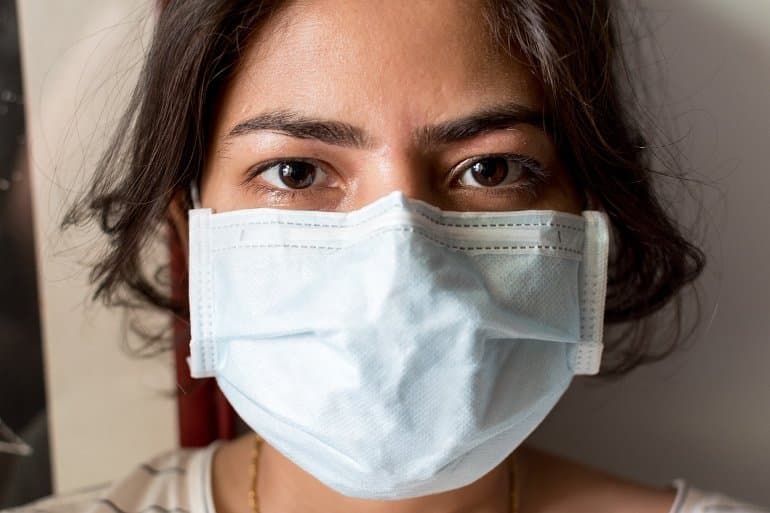Summary: 6 to 9-month-old babies can form memories of masked faces and recognize the faces when the mask is removed.
Source: UC Davis
Babies learn from looking at human faces, leading many parents and childhood experts to worry about possible developmental harm from widespread face-masking during the pandemic.
A new study by researchers at the University of California, Davis, allays those concerns, finding that 6- to 9-month-old babies can form memories of masked faces and recognize those faces when unmasked.
Michaela DeBolt, a doctoral candidate in cognitive psychology, and Lisa Oakes, a professor in the Department of Psychology and at the Center for Mind and Brain, used eye tracking to study how masks influence infants’ facial recognition.
In the study, 58 babies, each seated on a parent’s lap or in a highchair, were shown pairs of masked and unmasked women’s faces on a computer screen, while cameras recorded where they looked. Because babies linger longer over unfamiliar images, the researchers could derive which faces they recognized, DeBolt said.
The findings appear in a paper published in the January/February special issue of the journal Infancy, which focused on the impact of COVID-19 on infant development.
The testing took place at Oakes’ Infant Cognition Lab at the Center for Mind and Brain in Davis, California, from late December 2021 to late March 2022, during a statewide mask mandate and the arrival of the coronavirus omicron variant.
“When babies learned a masked face, and then they saw that face again unmasked, they recognized it,” DeBolt said.
However, when the order was reversed, babies did not show strong recognition of masked faces that they first saw unmasked. DeBolt said that was similar to her own experience of not instantly recognizing a friend who was wearing a face mask.

Learning faces is central to how babies learn to talk, perceive emotions, develop relationships with their caregivers and explore their environment, Oakes said. “So people were very worried about face masks and the effect they would have on how infants are learning about human faces.”
Oakes, an expert on cognitive development in infancy, said the study highlighted a remarkable ability of babies to adapt. “I think that it should be very reassuring to parents in general,” she said. “Babies all over the world develop and thrive.
“There are so many variations in babies’ everyday lived experience,” she added. “As long as they are well cared for and fed and they get love and attention, they thrive. We can get into a mode where we think the way we do things is the best way to do things and that anything different is going to be a problem. And that’s clearly not the case.”
About this neurodevelopment research news
Author: Kathleen Holder
Source: UC Davis
Contact: Kathleen Holder – UC Davis
Image: The image is in the public domain
Original Research: Closed access.
“The impact of face masks on infants’ learning of faces: An eye tracking study” by Michaela C. DeBolt et al. Infancy
Abstract
The impact of face masks on infants’ learning of faces: An eye tracking study
This preregistered study examined how face masks influenced face memory in a North American sample of 6- to 9-month-old infants (N = 58) born during the COVID-19 pandemic. Infants’ memory was tested using a standard visual paired comparison (VPC) task.
We crossed whether or not the faces were masked during familiarization and test, yielding four trial types (masked-familiarization/masked-test, unmasked-familiarization/masked-test, masked-familiarization/unmasked-test, and unmasked-familiarization/unmasked-test).
Infants showed memory for the faces if the faces were unmasked at test, regardless of whether or not the face was masked during familiarization. However, infants did not show robust evidence of memory when test faces were masked, regardless of the familiarization condition.
In addition, infants’ bias for looking at the upper (eye) region was greater for masked than unmasked faces, although this difference was unrelated to memory performance.
In summary, although the presence of face masks does appear to influence infants’ processing of and memory for faces, they can form memories of masked faces and recognize those familiar faces even when unmasked.






